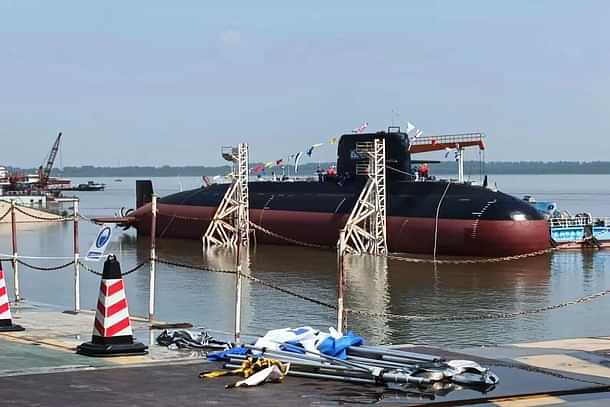Defence
While India’s P-75I Submarines Hang In Balance, Pakistan Is Racing Ahead With Next-Gen Chinese Boats
Ujjwal Shrotryia
Apr 29, 2024, 02:01 PM | Updated 03:52 PM IST
Save & read from anywhere!
Bookmark stories for easy access on any device or the Swarajya app.


While the Indian Navy’s project to acquire six next-generation submarines under Project-75I remains in limbo, Pakistan is racing ahead with its submarine program.
Three days ago (on 26 April), China launched the first of the eight Yuan-class submarines (Type-39A) meant for Pakistan’s Navy, otherwise known as the Hangor class in Pakistan, at Wuchang Shipbuilding Industry Group's (WSIG) shipyard in Shuangliu, China.
Under the contract signed in 2015, China will supply eight advanced submarines to Pakistan, of which four will be built at the WSIG facility in China and the rest at the Pakistani shipyard, Karachi Shipyard & Engineering Works (KS&EW), in Karachi.
The four to be built in Karachi will involve significant transfer of technology (ToT) from China.
However, the Indian Navy’s plan to acquire six next-generation submarines with Air-Independent Propulsion (AIP) under Project-75I, hangs in the balance.
The Indian Navy has been looking to induct these next-generation submarines for the past decade and a half. The project, even after so long, has not seen the light of day, with only the Germans with their Type-214 submarines and the Spanish with their S-80 submarines, in the fray.
The project has seen repeated delays due to a lack of funds, decision-making, and absurd contractual requirements.
Early this month, a team from the navy visited Germany to conduct a field inspection of the AIP system offered by ThyssenKrupp Marine Systems (TKMS), the German entrant in the P-75I program. The team will also visit Spain to do the same with their offering.
AIP, as the name suggests, is a propulsion technology that allows submarines to generate power without the use of atmospheric air. Conventional diesel-electric submarines have to frequently surface to take in oxygen from the air, producing electricity from diesel engines to charge their batteries. These batteries then run the electric motor that turns the propeller to generate thrust.
Most of the Pakistan Navy’s submarines are equipped with AIP. Pakistan Navy’s French-supplied Agosta-90B have had AIP installed since the 2000s.
The eight Hangor-class submarines will also have AIP.
The Indian Navy, on the other hand, has none.
In fact, even the latest French Scorpene-class submarines that the Indian Navy is inducting do not have AIP. It is expected that the first Scorpene-class submarine — INS Kalvari — will get an indigenous DRDO-designed-and-developed AIP system when it goes for its first scheduled refit sometime in 2024.
To make the situation even worse, there are reports that the DRDO-developed system may face further delays, further extending the timeline for installing indigenous AIP in the Scorpene-class submarines.
The Indian Navy is already short of submarines. It only operates 16 conventional diesel-electric submarines, while Pakistan and China have five (and eight Hangor submarines on order) and sixty-six submarines, respectively.
Generally, some submarines in a fleet are under refit at any given time.
This leaves only a small portion of the 16-submarine fleet operational at a given time. Last month, the Indian Navy deployed 11 such conventional submarines simultaneously in the Indian Ocean Region (IOR).
How long these three-to-four-decade-old submarines can maintain this high rate of operation remains to be seen.
As a stopgap, the navy has decided to buy an additional three Scorpene submarines from France to mitigate the reduced serviceability of the older submarines. This was announced last year when PM Modi visited France in July 2023.
However, according to The Print, cost negotiations for the additional three submarines have not yet started, hinting at further delays, while all this time China is increasing the size of its attack submarine fleet, and also supplying Pakistan with lethal submarines.
There are rumours that Pakistan might also use the nuclear-armed Babur-3 submarine-launched cruise missile from these Hangor-class submarines.
Therefore, India must get in gear and direct its energies toward getting the P-75I submarines in the water and also commence work on the follow-on indigenous Project-76 submarine program.
Staff Writer at Swarajya. Writes on Indian Military and Defence.





